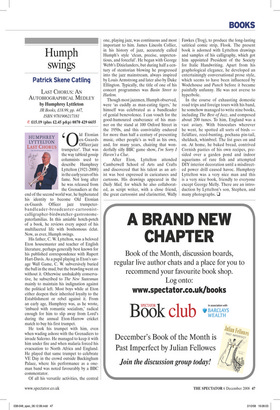Humph swings
Patrick Skene Catling
LAST CHORUS: AN AUTOBIOGRAPHICAL MEDLEY by Humphrey Lyttleton JR Books, £18.99, pp. 447, ISBN 9781906217181 ✆ £15.19 (plus £2.45 p&p) 0870 429 6655 ‘Old Etonian ex-Guards Officer jazz trumpeter’. That was the way tabloid gossip columnists used to describe Humphrey Lyttelton (1921-2008) in the early years of his fame. Not long after he was released from the Grenadiers at the end of the second world war, he hyphenated his identity to become Old Etonian ex-Guards Officer jazz trumpeterbandleader-broadcaster-cartoonistcalligrapher-birdwatcher-gastronomepaterfamilias. In this amiable hotch-potch of a book, he reviews every aspect of his multifaceted life with bonhomous éclat. Now, as ever, Humph swings.
His father, C. W. Lyttelton, was a beloved Eton housemaster and teacher of English literature, perhaps generally best known for his published correspondence with Rupert Hart-Davis. As a pupil playing in Eton’s savage Wall Game, C. W. subversively buried the ball in the mud, but the brawling went on without it. Otherwise unshakably conservative, he subscribed to The New Statesman mainly to maintain his indignation against the political left. Most boys while at Eton either deepen their inherited loyalty to the Establishment or rebel against it. From an early age, Humphrey was, as he wrote, ‘imbued with romantic socialism,’ radical enough for him to slip away from Lord’s during the annual Eton-Harrow cricket match to buy his first trumpet.
He took his trumpet with him, even when wading ashore with the Grenadiers to invade Salerno. He managed to keep it with him under fire and when malaria forced his evacuation to North Africa and England. He played that same trumpet to celebrate VE Day in the crowd outside Buckingham Palace, where his performance as a oneman band was noted favourably by a BBC commentator.
Of all his versatile activities, the central one, playing jazz, was continuous and most important to him. James Lincoln Collier, in his history of jazz, accurately called Humph’s style ‘clean, precise, unpretentious, and forceful’. He began with George Webb’s Dixielanders, but during half a century of stentorian blowing he progressed into the jazz mainstream, always inspired by Louis Armstrong and later also by Duke Ellington. Typically, the title of one of his concert programmes was Basin Street to Harlem.
Though most jazzmen, Humph observed, were ‘as cuddly as man-eating tigers,’ he himself was celebrated as a bandleader of genial benevolence. I can vouch for the good-humoured exuberance of his manner on the stand at 100 Oxford Street in the 1950s, and this conviviality endured for more than half a century of presenting music, other people’s as well as his own, and, for many years, chairing that wonderfully silly BBC game show, I’m Sorry I Haven’t a Clue.
After Eton, Lyttelton attended Camberwell School of Arts and Crafts and discovered that his talent as an artist was best expressed in caricatures and cartoons. His drawings appeared in the Daily Mail, for which he also collaborated, as script writer, with a close friend, the great cartoonist and clarinettist, Wally Fawkes (Trog), to produce the long-lasting satirical comic strip, Flook. The present book is adorned with Lyttelton drawings and samples of his calligraphy, which got him appointed President of the Society for Italic Handwriting. Apart from his graphological elegance, he developed an entertainingly conversational prose style, which seems to have been influenced by Wodehouse and Punch before it became painfully unfunny. He was not averse to hyperbole.
In the course of exhausting domestic road trips and foreign tours with his band, he somehow managed to write nine books, including The Best of Jazz, and composed about 200 tunes. To him, England was a vast aviary. With binoculars wherever he went, he spotted all sorts of birds — fieldfare, reed-bunting, pochana pin-tail, shelduck, whimbrel. The list goes on and on. At home, he baked bread, contrived Cornish pasties of his own recipes, presided over a garden pond and indoor aquariums of rare fish and attempted DIY interior decoration until a misdirected power drill caused havoc. Humphrey Lyttelton was a very nice man and this is a very nice book, friendly to everyone except George Melly. There are an introduction by Lyttelton’s son, Stephen, and many photographs. q


















































































 Previous page
Previous page